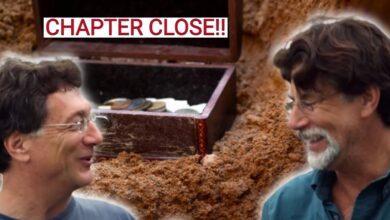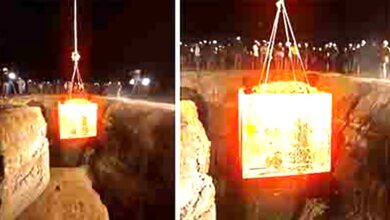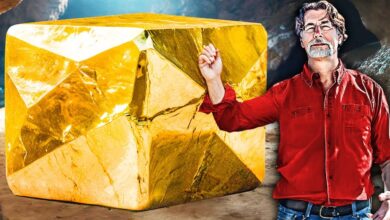The Curse of Oak Island: HUGE Connection Between Lot 5 and the Money Pit
The Curse of Oak Island: HUGE Connection Between Lot 5 and the Money Pit

…over 2,000 miles northeast
in Reykjavík, Iceland…
-RICK: What a beautiful day.
-ALEX: Yeah.
Basically collecting,
translating that knowledge
that was brought back
from the holy land
from people like the Templars.
NARRATOR:
Two weeks ago, Emiliano
and archeoastronomer
Professor Adriano Gaspani
gave Rick and the team a tour
of a 12th-century monastery
in Morimondo, Italy
that was built
by Cistercian monks,
a Catholic order
that constructed certain
Christian houses of worship
across Europe according to
astronomical alignments
with stars in the night sky.
DOUG:
We have the four-dot cross
carved on a stone on Oak Island,
along with a circle
with a dot in the center.
NARRATOR:
While there, the team not only
saw numerous Templar symbols
that have been found
over the years on Oak Island,
but were also
informed by Professor Gaspani
that the Templars may have
employed knowledge of astronomy
that they learned in such abbeys
in order to construct
megalithic formations
on Oak Island,
including the feature
made up of six boulders
known as Nolan’s Cross.
Eventually, that knowledge
reached, also, Iceland,
because what we know
is that between the 11th century
and the 14th century,
in this island,
were active more
than 15 monastic houses.
And those abbeys
produced hundreds
of manuscripts.
This one is evidence
that very specific knowledge–
and I’m talking about
astronomy, sacred geometry–
arrived here
and was processed here.
The oldest part is around 1190,
up to the early 14th century.
RICK:
What is the language?
EMILIANO:
The language is in Latin.
There are parts in Norse.
Emiliano, what have
you identified in this
particular manuscript
of interest to our quest?
EMILIANO:
Not only this manuscript
contains information
about astronomy,
but it also
names specific stars.
-RICK: Yeah.
-DOUG: Hmm.
-The primary alignment.
-EMILIANO: Yeah.
NARRATOR:
According to the research
of Professor Adriano Gaspani,
the star known as Arcturus,
which is part of
a constellation named Boötes,
was used as a key alignment
to create Nolan’s Cross
on the surface of Oak Island.
Is it possible
that Emiliano Sacchetti
has now found
a new connection between
Arcturus and
the Oak Island mystery
in a medieval Norse manuscript?
EMILIANO:
This says that it was
important to know the stars.
You know, celestial navigation,
and probably Arcturus,
which was called the day star
for its brightness.
So, probably, Arcturus
was one of the stars followed
because of its brightness.
ALEX:
It’s interesting because,
again, that says that’s
useful for sailing
at far north latitudes.
Yeah.
RICK:
There were many
interesting things
contained within the book,
stellar alignments
that we find
of significant interest
in how it may
relate to Oak Island.
And it’s possible
that as we follow
this trail of information,
it may become
more and more interesting,
and perhaps valuable, to us.
DOUG:
You know, I’m sitting here
looking at this book
and I’m just…
I’m marveling at it because
DOUG:
This is the ribbon-like symbol
on our copper piece,
and, curious, it’s next to
a representation of a cross.
RICK:
That’s remarkable.
It’s not just here
on this page, though.
It’s throughout the text.
RICK:
That’s very interesting.
ALEX:
Is this what you’re
talking about, Doug, here?
DOUG:
Yes.
Yeah, this symbol right here.
Oh, yeah.
EMILIANO:
Can you see it, Professor?
Yes. They look similar, yes.
NARRATOR:
In 2022,
Gary Drayton and Jack Begley
unearthed a copper artifact
bearing a number
of ornate symbols.
And when archaeologist
Dr. Edwin Barnhardt
analyzed a metallurgy report
conducted by Emma Culligan,
he made
a fascinating observation.
EDWIN:
It could be
some sort of older object.
The other possibility
is the Vikings.
DOUG:
You see, until we
fully understand
what this copper piece is…
I mean, it’s found in
pretty close proximity
to Nolan’s Cross.
NARRATOR:
Is it possible
that Doug Crowell has found
more evidence
in this 12th century manuscript
that may connect
the copper artifact
found on Lot 8
to the Viking culture?
If so,
could it also support the theory
that Vikings helped
the Knights Templar
bury priceless treasures
on Oak Island?
Makes me wonder
all the more whether
the astronomical constructs
we have on the island–
if this isn’t
somehow associated with it.
I-It’s remarkable. Stunning.
That symbol we see in the book
is the same symbol that
we see on the copper artifact.
You cannot ignore that.
We have found the possibility
of connective tissue
between this book
and representations of symbology
found on Oak Island.
I just think it’s
an incredible piece of history.
I’m certain all of us
will treasure
this moment
for a long, long time.
-GUNNLAUGSSON: Yes.
But the journey’s not over.
DOUG:
You’ve got us hooked.
RICK:
Thank you.
ÁRMANN:
Welcome to the National Museum.
-So nice to meet you.
-ALEX: Thank you.
Nice to see you. I’m Rick.
…Rick Lagina
and members of the team
arrive at the National Museum.
I’d like to introduce you
to Ármann Gudmundsson.
He’s the curator
of the artifacts
with The National Museum
of Iceland.
-Mm-hmm.
EMILIANO:
The main reason
why you’re here today is because
this museum hosts
some Roman coins
that were unearthed
in the southern part
of the island
-like we found on Oak Island.
-Perfect.
NARRATOR:
In addition to
the mysterious stone foundations
that the team
has unearthed on Lot 5
since they purchased it in 2022,
they were stunned
to also discover
four Roman coins
that have been dated
to between 1,500
and 2,000 years old.
So, uh, here we have the coins.
The Roman coins
that have been found in Iceland.
So I think that
the Norse settlers
that arrived here
in the late ninth century,
early tenth century,
brought them
with them.
-RICK: Mm-hmm.
Maybe found in the British Isles
-or something like that.
-Mm-hmm.
-Mm-hmm
-DOUG: I’m curious as to what
date these were minted on.
Do you know the years
the coins were issued?
Yeah, this is fourth century.
-Fourth century?
-ÁRMANN: Yeah.
-Well that’s great.
-Yeah.
DOUG:
We were told ours were
from fifth century A.D.
ALEX:
Right. There must have been
many incidents
of travel
for these to end up here.
It’s just evidence
of an interconnected
nature of everything much
earlier than we had thought,
-is what I’m saying.
-Oh, absolutely.
DOUG:
On Oak Island, we find coins
from the same basic era, but
the only known European activity
in our region of the world
before the 15th century
is the Norse.
So that, in my mind,
makes the Norse exploration
more important to
our investigation on Oak Island.
NARRATOR:
Is it possible that the team
has finally found evidence
of just who may have brought
the Roman coins
that were discovered on Lot 5
to Oak Island?
Could that explain other
discoveries,
including the piece
of possible ship’s railing
that was unearthed in the swamp,
the copper artifact
that was found on Lot 8,
or the numerous tools
and decorative lead pieces
which have been traced
to Scandinavia?
RICK:
Based on the information
derived here in Europe,
we know that there was
trade between the Mediterranean
and the Norse.
We know that the Norse
traveled the Atlantic.
It’s a possible explanation
why Roman coins
were on Oak Island.
It is explainable on some level.
Ármann, we certainly appreciate
your time
and we value your expertise.
Understanding history
has been beneficial
to our hunt, our search.
-Thank you for the information.
-Yeah, definitely








